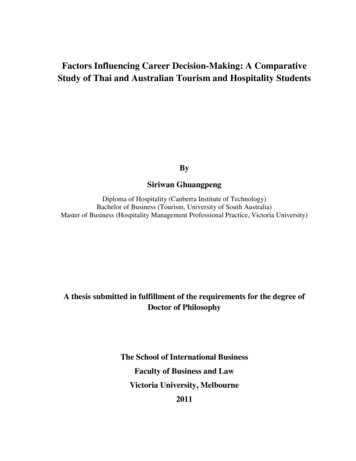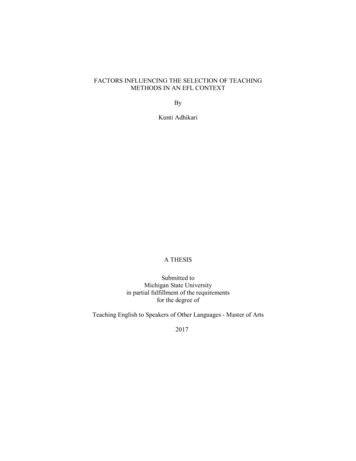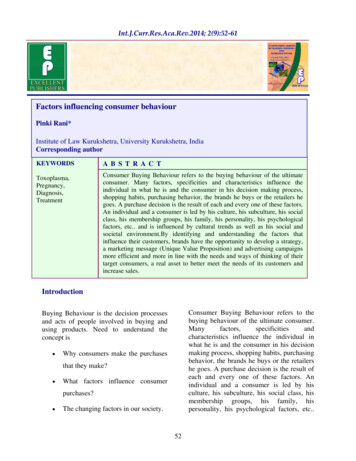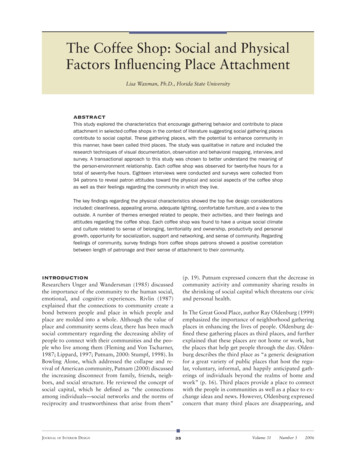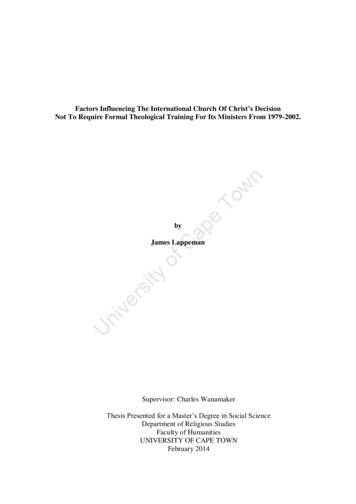
Transcription
apbyeTownFactors Influencing The International Church Of Christ’s DecisionNot To Require Formal Theological Training For Its Ministers From 1979-2002.UniversityofCJames LappemanSupervisor: Charles WanamakerThesis Presented for a Master’s Degree in Social ScienceDepartment of Religious StudiesFaculty of HumanitiesUNIVERSITY OF CAPE TOWNFebruary 2014
wnofCapeToThe copyright of this thesis vests in the author. Noquotation from it or information derived from it is to bepublished without full acknowledgement of the source.The thesis is to be used for private study or noncommercial research purposes only.UniversityPublished by the University of Cape Town (UCT) in termsof the non-exclusive license granted to UCT by the author.
2PLAGIARISM DECLARATION1.2.3.4.Signature:Date:I know that plagiarism is wrong. Plagiarism is to use another’s work andpretend that it is my own.I have used the Chicago Manual of Style (author-date) referencing guidefor citation and referencing. Each contribution to, and quotation in thisthesis from the work(s) of other people has been contributed, and has beencited and referenced.This thesis is my own work.I have not allowed, and will not allow, anyone to copy my work.
3Table of ContentsPreface . 5Abstract . 6Chapter 1. . 7Formal Theological Education in the ICoC . 71.1 How the ICoC Evolved . 71.2 The ICoC’s Change in Training Philosophy. 81.3 The Structure of this Thesis . 91.4 Research Methodology . 12Chapter 2. . 16Historical Overview of the ICoC and Its Policy of Formal Education Within theGreater Stone-Campbell Movement . 162.1 Introduction . 162.2 The Stone-Campbell Period. 172.3 From Stone-Campbell to the Churches of Christ . 222.4 From the Churches of Christ to the Boston Movement . 242.5 The ICoC (Boston until 2002) . 312.6 Conclusion . 34Chapter 3. . 36The Theological Education Debate in Twentieth Century USA and its impact on theICoC’s Training Decision . 363.1 Academia and Church . 363.2 Twentieth-Century Protestant Theological Institutions in the USA. 383.3 Conclusion . 39Chapter 4. . 40Authority in a New Religious Movement - The ICoC Case Study . 404.1 Studying NRMs and Church Schisms . 404.2 Max Weber on Authority: Charisma & Routinization . 414.3 Conclusion - Authority in the ICoC . 45Chapter 5. . 46The Factors Influencing the ICoC’s Approach to Formal Theological Education . 465.1 The Boston Movement’s Conflict with the CoC . 465.2 Kip McKean’s Personal Experience of Formal Theological Training . 505.3 CoC Colleges Perceived Loss of Training Credibility . 525.4 Kip McKean’s Authority and Conversion Success . 565.5 The ICoC’s Narrow Definition of a Trained Church Minister . 585.6 The ICoC’s ‘Model’ of Church Replication and Multiplication . 615.7 Allocation of Recourses Towards Missions . 645.8 A Foundation of Ministers who Already had Formal Theological Education . 65Chapter 6. . 69Conclusions and Reflection . 696.1 Conclusions . 696.2 The Post-McKean ICoC (2002-2014) . 726.3 Formal Theological Education in the ICoC (2002-2014) . 736.4 Reflection on the ICoC’s Future Approach to Formal Theological Education . 76Bibliography . 77Appendices . 89Appendix 1: The CoC – ICoC schism. 89Appendix 2: The Stone-Campbell movement – Major Splits . 90Appendix 3: The Interview Process . 91Appendix 4: Current ICoC Training Academies (Sample) . 99Appendix 5: Recent (2013) Developments on Kip McKean . 100
4AbbreviationsICoCInternational Church of Christ (Some sources abbreviate: ICOC)CoCChurches of ChristNRMNew Religious Movements
5PrefaceDuring my ten years as a minister in the ICoC, I have often had to field questionsfrom friends and relatives on why I had not formally studied theology. Many peoplecrossing my path assumed that some form of theological education is a ‘rite ofpassage’ for those desiring a life in the church ministry. Most of the time I had notrouble explaining my view that ministry was a very practical vocation and not onelearned in a classroom setting. Sometimes, however, I would agree with thoseskeptical of an approach that had so little in the way of deeper theological and biblicalinstruction. I was trained to thoroughly know my Bible, but I often felt that a richerinstruction would be beneficial to both myself and those I taught. The ICoC hasrecently shifted more attention towards theological education, which has partially ledto my choice of thesis topic.I would like to thank all those who have made this possible. First, I would like tothank my wife Maura for her unending support during many late nights behind thecomputer. Without her, my master’s degree would still be in the ‘dream’ phase. ToChuck Wanamaker, my supervisor, thank you for the many hours of input you havegiven me. Among the many areas of input, you have helped me to untangle somehorrendous paragraphs and you have really taken an interest in my chosen subject.Thank you for your advice on my academic future and warnings not to use thematerial for this thesis to edit on Wikipedia in case it looks like I plagiarised from thearticles I wrote. Chuck, you have been a great support and academic mentor to me.My thanks to Roger, JP, Al, Gordon, Steve, Douglas and Jack, who were kind enoughto grant me interviews and who helped to make sure that I got my facts straight. I wasalso fortunate to have some very kind friends who looked over my work and gaveinvaluable input: Cyril Stevens, Marisca Erasmus and John Oakes, you have been sokind in carrying the bulk of my final proof reading. To the many others who checkeda chapter here and there, you efforts are not forgotten.Finally, to Abdulkader Tayob and the Department of Religious Studies at theUniversity of Cape Town, thank you for providing me with a truly wonderfulexperience in your postgraduate programme.James LappemanFebruary 2014
6AbstractThis thesis seeks to investigate why the International Church of Christ (ICoC) schismadopted a very different ministerial training approach to the one long supported by itsparent church, the mainline Church of Christ (CoC). I explore how the ICoC(Formerly called the ‘Boston Movement’) became an independent Christianmovement and identify specific reasons for the ICoC’s departure from the CoC’sexpectation that church ministers receive an academic qualification in theology.The conclusions for this research were drawn from four sources. First, I analysed thesocio-historical influences on the ICoC’s philosophy of training ministers. Second, Idrew from Max Weber’s theory of “charisma and routinization” to provide atheoretical understanding of how the ICoC’s philosophy of education was partially anissue of authority. Third, I examined the literature directly relevant to the ICoC’straining choices. Finally, I conducted a series of interviews with prominent membersof the ICoC who gave their personal retelling of the early Boston Movement and why,from their perspective, the Movement adopted its methods of training.I argue that although a simple rationale was given at the time, at least eight sociohistorical factors influenced the ICoC’s pendulum swing towards an almostexclusively practical approach to ministerial formation. These influences wereinterlinked with a high degree of corroboration between them. The influences were: The Boston Movement’s schismatic conflict with the CoC. Kip McKean’s personal experience of formal theological training. The CoC colleges’ perceived loss of training credibility. Kip McKean’s authority within the Boston Movement The Boston Movement’s narrow definition of a ‘trained church minister’. The Boston Movement’s model of church replication and multiplication. The Boston Movement’s allocation of resources towards missions. A foundation of ministers who already had a formal theological education.The thesis closes with a reflection on the findings and the ICoC’s transition into itssecond generation of leadership.
7Chapter 1.Formal Theological Education in the ICoC1.1 How the ICoC EvolvedThe Boston Movement, later called the International Churches of Christ (ICoC), arosefrom within the Churches of Christ 1 (CoC) during the late 1970s. A progressivecampus initiative had started in the CoC and gathered momentum at a congregation inGainesville, Florida under the leadership of Charles (“Chuck”) Lucas. TheGainesville CoC became the epicenter of the Crossroads Movement 2 , whichinfluenced a number of CoC ministries by emphasising evangelism, high commitmentand accountability. Among those trained in Crossroads was Thomas Wayne (“Kip”)McKean, who eventually led his own CoC congregation in Boston, Massachusetts.While Lucas and the Crossroads Movement eventually faded from prominence,McKean and the Boston Movement became the center of this progressive wave andeventually separated completely from the CoC. The schism, and the connectionbetween the various Movements’ are detailed in Chapter two (Also see Appendix 1for a schematic).The Boston Movement was externally recognised as an independent ecclesiasticalbody in 1992 and renamed the International Church of Christ (ICoC) (Stanback 2005,73). By 2004, the ICoC was reported to have 135,000 members in 430 congregationslocated in almost 150 countries throughout the world (Foster, et al. 2004, 213). In2012, the reported membership was 99,384 in 632 churches3 (ICoC 2013, 24).1The CoC is part of the Stone-Campbell (Restoration) Movement that was well established in the USAat the time. The CoC is recognised as one of the major national denominations of the United States(Newman and Halvorson 2000, 60).2Both the Crossroads Movement and later the Boston Movement were grouped together as the‘Discipling Movement’ during this period.3The ICoC lost a significant number of members in the 2000s while it continued to pursue anexpansive strategy of church plantings. This explains why there is a simultaneous increase incongregations and decrease in membership (See Chapter 2.5 and Chapter 6.2 for further explanation forthis numerical decline in membership).
81.2 The ICoC’s Change in Training PhilosophyAlthough many early Stone-Campbell preachers in the nineteenth century were selfeducated (Hughes 1996, 331), by the mid-twentieth century a tertiary theologicaleducation became the standard route for those desiring a CoC ministerial position.More than ninety percent of ministers had either college degrees or certificates fromschools of preaching (Foster, et al. 2004, 215). While a degree was never formalisedinto a requirement 4, a graduate school education was certainly accepted as the rightpath into the ministry. The CoC therefore built a number of universities and Biblecolleges’ like Abilene Christian University, Pepperdine University, SunsetInternational Bible Institute and Harding University (Foster, et al. 2004, 219). By the1970s, an internship had been added to the expectation of theological education. Uponcompletion of this “medical residency” type internship, it was expected that aneducated minister would be ready to assume a full-time position in a campus ministryand eventually a church (T. Jones 2007, 39).When the Boston Movement broke away from the CoC, the new movement took acompletely different approach to training. Many CoC ministers joining the BostonMovement already had a theological degree, but new ministers were discouragedfrom pursuing this form of qualification. Instead of formal theological education, theICoC chose a pattern of mentorship in order to train leaders in situ5 (Stanback 2005,58-59). In an editorial entitled Revolution Through Restoration (1992, 4), KipMcKean stated that: “ though helpful in scholastic pursuits, seminary was not theway to train ministers, but rather, one minister walking with another, like Jesus andthe twelve”. His editorial on the Boston Movement’s development covered principlesof ‘training’ 6 , and how McKean decided not to send ICoC ministers to attendseminaries (p. 5). McKean stated that those in the movement “ came to believe thatthe best way to become an evangelist was to train full time and walk with and imitatethe one you desired to become like as they followed Jesus” (p. 9). While McKean’s4The churches were largely autonomous and so no rules could be imposed beyond those established bythe local congregation (D. A. Foster 2005, 1780).5While mentorship (‘discipling’) was the most emphasised element of ministerial training, the BostonMovement did stress a serious commitment to knowing the Bible. Throughout the literature on theMovement, references were made to in-house “Ministry Training Program(s)” (Stanback 2005, 85) andsimilar Biblical training.6In the twenty-one pages of his editorial Revolution through Restoration (1992), McKean referred to‘training’ ICoC ministers on thirty one occasions.
9rationale was clearly affirmed, this thesis will show that there were a number of sociohistorical factors influencing the ICoC in the decision not to require formaltheological education of its ministerial trainees.1.3 The Structure of this ThesisThis thesis is organised around six chapters:In Chapter one, I define the parameters for this research, and give the rationale behindthe choice of terms and date range. I also explain the methodology used to seek anddraw my conclusions.Chapter two offers an historical overview of the ICoC with two purposes in mind.First, the summary contextualises the ICoC as part the larger Stone-Campbell (orRestoration Movement) tradition of churches7. Second, as each period of the (ICoCrelevant) Stone-Campbell history is conveyed, the philosophy of theologicaleducation is highlighted. The focus on theological education, or lack thereof, givesevidence of an undercurrent of social forces that impacted on the ICoC’s decisions inthis regard.Chapter three provides a summary of key developments within Protestant theologicaleducation in the United States during the twentieth century. The chapter allowseducational developments in both the CoC and ICoC to be compared to institutionsoutside of the Stone-Campbell churches. This allows for trends specific to the ICoC tobe isolated.Chapter four provides sociological insights into the ICoC’s decision-making in itsfirst generation. By using Max Weber’s theory of ‘Charisma and Routinization’, aframework is laid which is used to contrast the authority residing in the BostonMovement’s then leader, Kip McKean, and other sources of authority like seminaries.Some more recent scholars on religious schisms and new religious movements will7Included is a detailed explanation of the relationship between the Crossroads and Boston Movements’that later became the ICoC
10also be used to provide insight on authority and its influence on decisions in firstgeneration movements such as the one being studied.Chapter five shows that at least eight definable factors contributed to the ICoC’sdecision not to require formal theological training from 1979-2002. The evidence forthe thesis is presented by blending both the primary and secondary sources ofqualitative data in these findings.Finally, chapter six concludes with a reflection on the findings. I also describe somedevelopments in the ICoC’s post 2002 policy on the topic of theological education.TerminologyIn order to prevent potential ambiguity, I have provided definitions for three keyterms that are sometimes given different meanings.‘Formal Theological Training’By ‘formal theological training’, I take Wytock’s definition that describes formaltheological training as: “those formal studies in theology or divinity conductedthrough disciplined pedagogical forms involving a systematic course of instruction.This study thus draws out and develops mental or intellectual thought in the study oftheology” (Wytock 2003, 6).‘Influencing’I have chosen the word ‘influencing’ as opposed to a term that is more direct such as‘causing’. This decision was a partial result of Eliade’s notion that reduction is the‘cardinal problem’ in the study of religion (Eliade 1958, 29). Baker echoed this whenwarning against psychological ‘reductionism’ that occurs when scholars reducecomplex social phenomena to a single cause (Baker 1999, 104). The definition alsoimpacts on my analysis in which I chose not to weigh the findings. I do not assign
11weights to the different factors because any such quasi-statistical result would be theresult of an arbitrary and unprovable choice.‘Ministers’There are different interpretations of the word ‘minister’ in religious contexts. Tosome Christian denominations, it is synonymous with ‘priest’ or a member of the‘clergy’ (Pollard 2000, 513). The Encyclopedia of Christianity (Fahlbusch 2008, 540)defines ministry as: “carrying forth Christ's mission in the world” which has auniversal application for Christian service and is not reserved for those in leadershippositions. Alexander Campbell, and to a lesser extent Barton Stone, the founders ofthe Stone-Campbell Movement were opposed to a clergy/laity distinction (Tristano1988, 86). In alignment with Campbell, neither the CoC nor the ICoC distinguish paidpreachers and non-paid members through sacramental theology (Foster, et al. 2004,663). The Stone-Campbell Movement has, however, continued to debate theunderstanding of, and terminology for paid ministerial offices. Each branch of theStone-Campbell Movement has taken a different trajectory in terms of qualifications,expectations and terminology for its ‘ministers’ (Foster, et al. 2004, 521-533). TheCoC took a strong anticlerical position and, similarly, the ICoC expects all members(paid or not) to perform pastoral duties (McKean 1992, 8). The ICoC’s stance onleadership and congregational autonomy contrasted with the CoC as it employed andmanaged paid leaders in a formalised and structured way. For this thesis, I thereforedefine ‘ministers’ as those members of a church who are formally employed by thechurch in order to fulfill pastoral duties (also known as ‘Evangelists’ in the ICoC).Date Range (1979-2002)The date range for this thesis encompasses the tenure of Kip McKean from his moveto Boston in 1979 until his resignation as the leader of the ICoC in 2002. As noted byLewis and Lewis (2009, 3) and Wessinger (2005, 6513-6514), the exact date of aschism is often impossible to isolate. Both the Crossroads and Boston Movements’were essentially the same progressive wave with a change in name happening as thecenter shifted from the Crossroads CoC to the Boston CoC. This shift initially
12happened because of Lucas’s 1985 resignation from leadership at Crossroads andMcKean’s increased prominence. At this time, the movement began to be called theBoston Movement. The 1992 renaming of the Boston Movement (to the ICoC) wasthe external recognition of a schism that was already concrete in practice.Due to the potential ambiguity in dating, I have settled on starting the research rangein 1979, which was the year that McKean moved to Lexington, Massachusetts, andestablished the Boston CoC. In 2002, McKean resigned from his position as leader ofthe ICoC. He had taken an indefinite sabbatical in 2001 at the request of the seniorleadership in the Los Angeles ICoC8, but there was still uncertainty as to his future(Stanback 2005, 121-125). After 2002, with McKean’s departure from the helm of theMovement, the ICoC went through a transition. Most of the McKean-era hierarchywas dismantled and the Movement searched for a different model of leadership (D. A.Foster 2005, 1781). Although new religious movements’ (NRM’s) often only entertheir second generation at the death of their founder (Fox 2005, 326) (J. G. Melton1991, 1), McKean’s resignation from all major leadership responsibilities 9 in 2002can be regarded as constituting the end to the ICoC’s first generation and hence thechoice of dates.1.4 Research MethodologyThere is currently no unified record of the socio-historical factors influencing theBoston Movement’s decision not to require formal theological education 10 . Thetesting of my thesis involves a qualitative investigation of literary and human sourcesboth from within and outside of the Boston Movement (later ICoC). In order toextract the results relevant to this research, five groups of potential data are exploredand combined as sources for a qualitative analysis. First, literature relating to theCoC’s philosophy and history of educating ministers has been extracted from varioussources on the Movement’s history. Second, literature relating to theological8McKean moved the ICoC headquarters to Los Angeles, California, in 1990. Part of his rationale wasto build a “super-church” in the city as an example to the other Boston Movement churches’ (Stanback2005, 108)9McKean initially stayed on in the ICoC and led a congregation in Portland, Oregon, for a few years.He eventually left the ICoC to start a new movement (The International Christian Church) in 2006(Harding 2012). His departure from the Movement that he was so instrumental in starting furthermakes the point that the first generation of the ICoC ended in the early 2000s.10To the best of the authors knowledge as of February 2014
13education in twentieth century United States allows me to isolate phenomena that areCoC/Boston Movement specific and not just trends in general educational theory atthe time. Third, the writings of Max Weber and other sociologists of religion are usedto help understand the authoritative forces in new religious movements such as theBoston Movement. The role and locus of authority is particularly relevant whencomparing the power given to individuals as opposed to institutions of theologicaleducation. Fourth, the relatively limited writing on the thirty-five year history of theICoC provides insight into the perceived and stated reasons for its decisions aroundformal theological education. Finally, building on the foundational knowledge of theabove elements, a set of interviews with current senior members of the ICoC has beenconducted. The interviewees were selected for their particularly strong ties to the firsttwo decades of the movement and Kip McKean himself. The combination of thesefive elements allowed for conclusions to be drawn and to test the thesis that it was notonly McKean’s perspective on how to train ministers that influenced the BostonMovement’s educational policy.AnalysisFor qualitative analysis, I have drawn from the Miles and Huberman approach. Theanalytical approach comprises of a continuous three-phased process: ‘data reduction’,‘data display’, and ‘conclusion drawing/verification’ (Miles and Huberman 1994, 4).The Miles and Huberman approach is an appropriate tool for this research as itassumes that qualitative research design should not be standardised and that acustomised approach will create research that meets the needs of the central researchquestion. The approach also allows for various forms of qualitative data, in this caseliterature and interviews, to be incorporated into the analysis (Fielding and Lee 1998,40).The reduction phase is the process whereby research material is selected andcondensed. This is done based on a conceptual framework and keeps the centralresearch question as the foundation (Miles and Huberman 1994, 430). By reducingthe information relating to the research question, one is able to locate potential causalfactors. This phase is also referred to as first level coding (Punch 1998, 205).
14While the above process continues, the reduced data identified as relevant to theresearch question is arranged. The arrangement is done in order to allow theresearcher to identify, focus on, and select potential interpretations of the data. Theprocess is referred to as second level coding. With display, patterns become strongerand the first level codes are arranged into thematic clusters for analysis (Punch 1998,204). Thematic clusters or ‘pattern codes’ assisted in the process of identifyingrelationships that exist between the data.The final phase of analysis involves drawing “broad, but substantiated interpretationsof displayed data” (Fielding and Lee, 1998: 42 citing Miles and Huberman, 1998).Verification of the data is done by cross referencing the different sources and thentesting some early conclusions against the opinions of the primary sources.Additionally, verification is established by confirming whether findings under onethematic cluster were supported by other findings within the coded data. Theverification is done as many of the identified factors could overlap and consequentlybuild rigour into the research. While some researchers allow weighted values to beassigned to thematic clusters, this is not a necessary step (Punch 1998, 294).Over the period in which I collected literary data (November 2012 – June 2013), anumber of themes emerged relating to my thesis. While some themes had more directcorrelation to the topic than others, an initial framework for my findings took shape.By including personal interviews, I added substantiation to some of the existingthemes, and new themes were generated. The interviews caused me to question earlyassumptions and proved invaluable in testing my thesis. In the end, I could arrangemy findings in a way that would account for the most prominent factors thatinfluenced the ICoC (formerly Boston Movement) in the decision not to requireformal education for their ministers from 1979 to 2002.SourcesThere are a number of published works on the CoC and ICoC. The mostcomprehensive of these writings have come from historians within the StoneCampbell tradition of churches. In the Encyclopedia of the Stone-CampbellMovement (2004), the editors devote the first section of the book to highlighting
15some problems with the general Stone-Campbell church histography (Foster, et al.2004, xxi-xxxv). One relevant point made by the editors was that many writings’ fromwithin the Stone-Campbell Movement had a bias towards triumphalism11 (Foster, etal. 2004, xxxii). The early Boston Movement is no exception. The general problem ofobjectivity and selection in historical writing is further complicated when it comes tothe study of church history (Evans 1997, 252-253). Bradley and Muller (1995, 55)recognise the challenges of studying church history that is intertwined with core beliefof a God who acts throughout history. Each Church historian will view differently theinvolvement of God depending on his/her theological understanding and researchstance.Despite these challenges above, it is possible to gather enough information from thesesources in order to address the research question with rigour as promoted by De Wet
colleges' like Abilene Christian University, Pepperdine University, Sunset International Bible Institute and Harding University (Foster, et al. 2004, 219). By the 1970s, an internship had been added to the expectation of theological education. Upon completion of this "medical residency" type internship, it was expected that an




